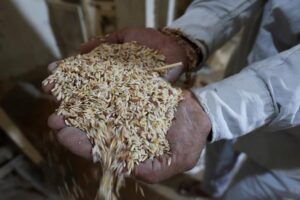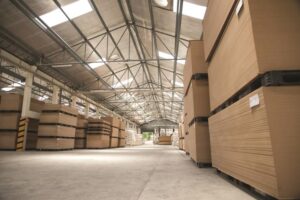BL Bengani is a visionary man who revolutionized plywood making by creating a green and sustainable alternative. Plywood is extensively used in India for a variety of reasons from building furniture to flooring to doors and much more. However, the process of making plywood is taxing to the environment.
India is the world’s second-largest manufacturer of plywood, only second to China. According to the industry reports, the domestic market for plywood stands at Rs 239.9 billion in 2021. The report projected that this figure would reach Rs 344.2 billion by 2027.
Ordinarily, plywood is made by assembling thin layers of wood veneers which are then bonded together using strong adhesives. This method has grown popular over the years as it has been used for a variety of applications.
The Source: Wood
As the name suggests, plywood is made from wood at the end of the day which means more trees would be cut just to meet the increasing demand. Due to the unsustainable practice, an industry veteran tried to approach the problem with a method that would be sustainable and would take the industry in a different direction.

BL Bengani
Image Source: IndiaTimes
BL Bengani, a Chennai resident, began working tirelessly to find the solution to the problem. BL Bengani has more than 30 years of experience in the plywood and panel product field. Moreover, he has worked with some bigwigs in the industry.
BL Bengani’s Green Alternative
In 2016, BL Bengani sold his stake at Uniply and began the path to research alternatives to wood-based plywood. While speaking to IndiaTimes, Priyanka Kucheria said, “He divested all his stakes as he wanted to come up with something new, for a couple of reasons. The first was the availability of logwood, which was being reduced due to the restrictions imposed by several states on tree cutting. He also realised that the future will be of alternative plywood.”

Image Source: IndiaTimes
Priyanka Kucheria is BL Bengani’s daughter and the Head of Marketing at Indowud. BL Bengani did not look far for an alternative as there were several rice mills in the area. He created the first plywood that was primarily based on rice husk. He called his invention Natural Fibre Composite Board or NFC Board.
Prinkya told reporters, “He travelled around the world and spoke to several people in the industry as part of the research and took feedback. The entire research process took almost two years, to get the right combination. It was market ready by 2019.”
How are they made?
NFC boards are entirely made from using agri-waste, natural minerals, non-toxic thermos coupling agents and virgin polymer as bonding agents. The manufacturing process begins with crushing the husk into powder form, followed by drying it at 70-80 degrees to reduce moisture content, which serves as the board’s base.

Image Source: IndiaTimes
What are the benefits of the board?
According to Priyanka, the NFC boards have more advantages over the traditional plywood. She says, “The NFC boards are 100 per cent termite proof and waterproof, weather resistant and also flame resistant. You can even use NFC boards for exterior applications, gardens, etc. It is also fully recyclable.”
Additionally, the NFC boards are also thermoforming, meaning that they can be given shapes after applying heat which plywood cannot. Moreover, these boards have the potential to end stubble burning in the north as any crop husk can be used to make these boards.

Image Source: IndiaTimes 3
Priyanka said that when BL Bengani created the NFC board, he used rice husk as it was abundantly available. However, she said that any crop residual can be used.
She told reporters, “We used for rice husk because this is south India and there is an abundance of supply of it here. However, this same formula can be used to create NFC boards from a varied range of crop residuals including coconut fibre, pineapple leaf and cocoa husk, which we want to explore in the future.”
The Market Presence
Ever since the NFC boards were introduced, the company created a niche and was doing good business. Moreover, they are confident that NFC boards will become a competitive product as the people’s interest in sustainability will grow.
Priyanka says, “Currently we have our presence in around 12 states across India. Recently we also started exporting to Australia, New Zealand and Oman. We are also trying to expand our international presence.”

Image Source: IndiaTimes
Indowud’s Chennai factory has a production capacity of 2 lakh NFC sheets, which according to the company, would save 10,000 cubic metres of natural wood annually from being cut.
References: IndiaTimes
Featured Image Source: Youtube@Indowud





















































































